116 scholarly books by Omnidawn and 8
start with L
116 scholarly books by Omnidawn and 8
116 scholarly books by Omnidawn
8 start with L start with L
8 start with L start with L
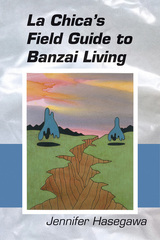
La Chica's Field Guide to Banzai Living
Jennifer Hasegawa
Omnidawn, 2019
From the small towns strung along the coast of the Big Island of Hawai‘i to the land-locked landscapes of Paraguay to the volcanic surface of Venus, this collection of poetry is a field guide to flora, fauna, and mineralia encountered, real, and imagined. Jennifer Hasegawa scans across physical and mental planes to reveal their inhabitants. Packed tightly into exploratory rocket segments, these poems ignite our gravest flaws to send our grandest potentials into orbit.
Hasegawa’s poems not only rearrange our ways of seeing the world, but they also reset the language we use in it. Banzai, with a literal translation of “10,000 years,” was used by the Japanese as a rallying cry in imperialistic and militaristic contexts. Today, the understanding of this word has shifted to a comparatively neutral translation of the enthusiastic expression “Hurrah!” in both in Japan and beyond. In La Chica’s Field Guide to Banzai Living, Hasegawa aims to reclaim banzai, recasting the language of war and unwavering loyalty and forming it into one that stands against aggression and racism and embraces tolerance and self-acceptance. Here banzai becomes a rallying cry not of war but of grand potential. La Chica’s Field Guide to Banzai Living chronicles a celebratory life and poetry filled with wonder.
Hasegawa’s poems not only rearrange our ways of seeing the world, but they also reset the language we use in it. Banzai, with a literal translation of “10,000 years,” was used by the Japanese as a rallying cry in imperialistic and militaristic contexts. Today, the understanding of this word has shifted to a comparatively neutral translation of the enthusiastic expression “Hurrah!” in both in Japan and beyond. In La Chica’s Field Guide to Banzai Living, Hasegawa aims to reclaim banzai, recasting the language of war and unwavering loyalty and forming it into one that stands against aggression and racism and embraces tolerance and self-acceptance. Here banzai becomes a rallying cry not of war but of grand potential. La Chica’s Field Guide to Banzai Living chronicles a celebratory life and poetry filled with wonder.
[more]
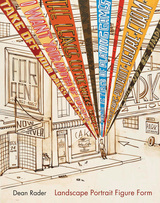
Landscape Portrait Figure Form
Dean Rader
Omnidawn, 2014
A frog and a toad walk into a book of poems. They meet Paul Klee, Hieronymus Bosch, Adrienne Rich, Sesshu Toyo, Mark Twain, all of them escorted by Dean Rader. There are adventure poems, landscapes, assassins, self portraits, there are what some might call “ideas” mixed with some very funny moments, and what we might quite seriously call “emotions.” This collection will engage those interested in innovative, arresting, humorously engaging poetry.
[more]

Letters from the Black Ark
D.S. Marriott
Omnidawn, 2023
Rhythmic lyrical poems that embody black music, existence, and tragedy.
The poems in this collection center on the word “dub,” which accrues a subtle lyrical connotation throughout its various forms and meanings—to bestow, vest, crown, and also to suspend, reverb, echo, and sever. Dub poetry plays with revealing and concealing, while also pointing the way to the conditions that produce black poetic music. In D.S. Marriott’s poetry, tragic catastrophes of current black existence—London knife crime, the Windrush scandal, Grenfell, and deadly race violence—are portrayed as questions of language. To speak this language, as Marriott’s poem show, is to take on the forces that cause rupture. Throughout these poems of loss, exile, and obliteration, the poet foresees his downfall and metamorphosis, ultimately realizing too late that he cannot transcend the reverberations and echoes laden with black social death.
The poems in this collection center on the word “dub,” which accrues a subtle lyrical connotation throughout its various forms and meanings—to bestow, vest, crown, and also to suspend, reverb, echo, and sever. Dub poetry plays with revealing and concealing, while also pointing the way to the conditions that produce black poetic music. In D.S. Marriott’s poetry, tragic catastrophes of current black existence—London knife crime, the Windrush scandal, Grenfell, and deadly race violence—are portrayed as questions of language. To speak this language, as Marriott’s poem show, is to take on the forces that cause rupture. Throughout these poems of loss, exile, and obliteration, the poet foresees his downfall and metamorphosis, ultimately realizing too late that he cannot transcend the reverberations and echoes laden with black social death.
[more]
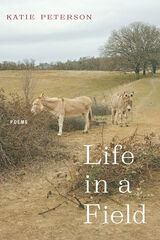
Life in a Field
Poems
Katie Peterson
Omnidawn, 2021
This is a comedy about climate change, in which a girl and a donkey become friends, then decide to marry time.
A lyric fable, Life in a Field intersperses Katie Peterson’s slow-moving, cinematic, and sensual writing with three folios of photographs by Young Suh. Introspection, wish, dream, and memory mark this tale, which is set in a location resembling twenty-first-century California—with vistas and orchards threatened by drought and fires. This is also a place of enchantment, a fairy-tale landscape where humans and animals live as equals. As the girl and the donkey grow up, they respond to the difficulties of contemporary civilization, asking a question that meets our existential moment: What do you do with the story you didn’t wish for? A narrator’s voice combines candor with distance, attempting to find a path through our familiar strife, toward a future that feels all but impossible, and into what remains of beauty and pleasure. Life in a Field tries to reverse our accelerating destruction of the natural world, reminding us of “the cold clarity we need to continue on this earth.”
A lyric fable, Life in a Field intersperses Katie Peterson’s slow-moving, cinematic, and sensual writing with three folios of photographs by Young Suh. Introspection, wish, dream, and memory mark this tale, which is set in a location resembling twenty-first-century California—with vistas and orchards threatened by drought and fires. This is also a place of enchantment, a fairy-tale landscape where humans and animals live as equals. As the girl and the donkey grow up, they respond to the difficulties of contemporary civilization, asking a question that meets our existential moment: What do you do with the story you didn’t wish for? A narrator’s voice combines candor with distance, attempting to find a path through our familiar strife, toward a future that feels all but impossible, and into what remains of beauty and pleasure. Life in a Field tries to reverse our accelerating destruction of the natural world, reminding us of “the cold clarity we need to continue on this earth.”
[more]
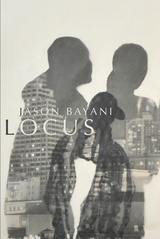
Locus
Jason Bayani
Omnidawn, 2019
Life in a multicultural, multiethnic nation like the United States leads to complicated, sometimes fragmented experiences of our background and identity. In Locus, Jason Bayani’s poetry explores the experience of identity that haunts Pilipinx-Americans in the wake of the 1965 Hart-Celler Immigration Act, a critical moment left out of most histories of Asian-American life in the United States. Bayani’s poetry seeks to recuperate this silenced experience, rendering the loss of memory migration entails and representing the fragments of cultural history that surface in a new national context. Drawing inspiration from the mixing and layering of musical fragments in DJ culture, Locus lays down tracks of memory to create a confident declaration of a distinctly Pilipinx-American voice, history, and artistic power. Indeed, his work reveals how these new creations often tie us to the most fundamental parts of ourselves: our families, our cultures, the vague memories passed down through generations.
In Locus, Bayani both renders the challenges of migration and captures an experience of selfhood and history, asserting a central place for migrant identity and experience in American culture.
[more]
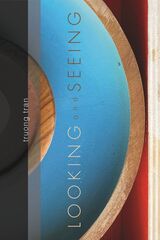
Looking and Seeing/Seeing and Looking
Damon Potter and Truong Tran
Omnidawn, 2023
Two books bound together that interrogate race—one from the perspective of a man of color, and the other from the perspective of a white man.
This book brings together different perspectives under two titles, considering the lives and experiences of two friends, one Vietnamese American and one white. Looking And Seeing is a poetic work of yearning, regret, and righteous indignation. In Truong Tran’s poetry, what is said and what is written reveal our complexities. Composed as an investigation of his own being and body as a brown person moving through white spaces, this collection moves alongside Tran’s friend and collaborator Damon Potter. Seeing and Looking offers a record of Potter’s perspective as a white man examining who he is and wants to be and the complications of trying to be good while also benefiting from histories of oppression. Potter considers death—both his own future death and the deaths of his friends—while grappling with how to witness horrors, wonders, and his self.
This book brings together different perspectives under two titles, considering the lives and experiences of two friends, one Vietnamese American and one white. Looking And Seeing is a poetic work of yearning, regret, and righteous indignation. In Truong Tran’s poetry, what is said and what is written reveal our complexities. Composed as an investigation of his own being and body as a brown person moving through white spaces, this collection moves alongside Tran’s friend and collaborator Damon Potter. Seeing and Looking offers a record of Potter’s perspective as a white man examining who he is and wants to be and the complications of trying to be good while also benefiting from histories of oppression. Potter considers death—both his own future death and the deaths of his friends—while grappling with how to witness horrors, wonders, and his self.
[more]
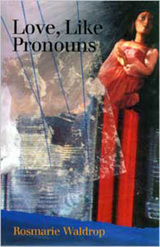
Love, Like Pronouns
Rosmarie Waldrop
Omnidawn, 2003
With the title of her latest collection, Love, Like Pronouns, Waldrop demonstrates with deft humor the relational aspects of any discourse. And, she implicitly suggests the similar slipperiness in human emotion and in human speech, as both the love object and the pronoun's referent easily shift with, even because of any attempt to articulate it. The title also subtly resonates with Waldrop's admiration for other writers, as well as demonstrates her awareness that each act of writing occurs in relation to—and within—the environment of other writings, past and present. In this collection, poem cycles dedicated to other writers echo with subtle synchronisms of that writer's forms, tones, textures. Yet from out of this synchronism, Waldrop evolves her own unique mediums of address. Each poem travels its own distinct and unrepeatable conduit between experience and language. Waldrop is an accomplished and applauded writer of poetry, fiction, essays and translation.
[more]
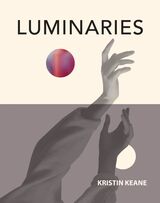
Luminaries
Kristin Keane
Omnidawn, 2021
Agnes has been drifting away from herself. People look through her, her husband doesn’t understand her, and lately, she’s begun losing the sensations in her body. When a tube of shoplifted lipstick awakens her back to life, an impulse for stealing emerges that leads her to a court-ordered service at a camp for grieving children. While initially hoping only that the time there will help her give up stealing, Agnes soon learns that she can use objects to connect grieving children with the spirits of their parents. She must navigate the choice between using her compulsion for her own pleasure and helping the bereaved. Luminaries is about the things we take and about the things that are taken from us. It asks what it means to exist in lives filled with loss, to reach for the things we hope will restore us, and the risks we’re willing to take to ward off yearning—both in our material lives and social lives.
Luminaries is the winner of the Omnidawn Fabulist Fiction Novelette/Chapbook Prize, selected by Kellie Wells.
Luminaries is the winner of the Omnidawn Fabulist Fiction Novelette/Chapbook Prize, selected by Kellie Wells.
[more]
READERS
Browse our collection.
PUBLISHERS
See BiblioVault's publisher services.
STUDENT SERVICES
Files for college accessibility offices.
UChicago Accessibility Resources
home | accessibility | search | about | contact us
BiblioVault ® 2001 - 2024
The University of Chicago Press









